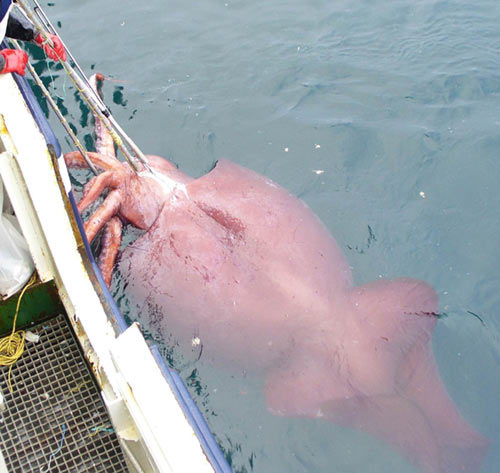Colossal Squid Is No Monster, Study Finds

Measuring longer than a school bus and sporting tentacles covered in razor-sharp hooks, the colossal squid is the stuff of nightmares. However, new research suggests the enormous sea creature may not be the fierce hunter of legend.
This finding not only upends science's understanding of the squid itself, but forces a reevaluation of its role in the entire ecosystem where it lives some 3,000 to 6,000 feet (914 to 1,830 meters) beneath the Antarctic sea.
This new view of the colossal squid comes from data analysis made by marine biologists Rui Rosa, of the University of Lisboa, Portugal, and Brad Seibel, of the University of Rhode Island. Rosa and Seibel looked at the relationship between metabolism (how the body's cells turn food into energy) and body size for smaller squids in the same family and used the information to predict the metabolism of the colossal squid (Mesonychoteuthis hamiltoni).
(The so-called giant squid belongs to the genus Architeuthis, a different group of animals from the colossal squid.)
They found, the squid would've had a slower metabolism and so moved slower than expected, waiting for prey, rather than running it down. "Everyone thought it was an aggressive predator, but the data suggests otherwise," Rosa told LiveScience. "It's a squid that weights half a ton with hooks in its tentacles, but our findings show it’s more like just a big blob."
Contrary to the image of Kraken-like shellfish attacking ships and dragging sailors to their deaths, this new data paints a picture of a mostly sedentary creature, Rosa said. Rather than swimming after prey, the colossal squid would wait to ambush passing fish.
And if the colossal squid consumed and expended less energy than previous thought, as this data indicates, then biologists will also need to reevaluate the squid's role as whale food, Rosa said.
Sign up for the Live Science daily newsletter now
Get the world’s most fascinating discoveries delivered straight to your inbox.
"Because the squid is more cold-blooded than we thought, they are not really that nutritious," Rosa said. "The whale is not getting much by eating it. They'd have to consume a lot of squid to maintain their lifestyle."
Rosa also noted that since so little is known about the colossal squid, almost any new discoveries are likely to overturn existing theories. The fact that the squid lives in such deep and frigid waters makes it almost impossible for scientists to acquire new specimens.
"We didn't really have live measurements, because it's almost impossible to go to the ocean and catch one," Rosa said. "We know more about the moon than the deep sea. It's a cliché, but it's true, especially in the Antarctic."
The study was detailed online on April 20 in the Journal of the Marine Biological Association of the United Kingdom.
- Our 10 Favorite Monsters
- Rare Giant Squid Caught in Gulf of Mexico
- Dangers in the Deep: 10 Scariest Sea Creatures










